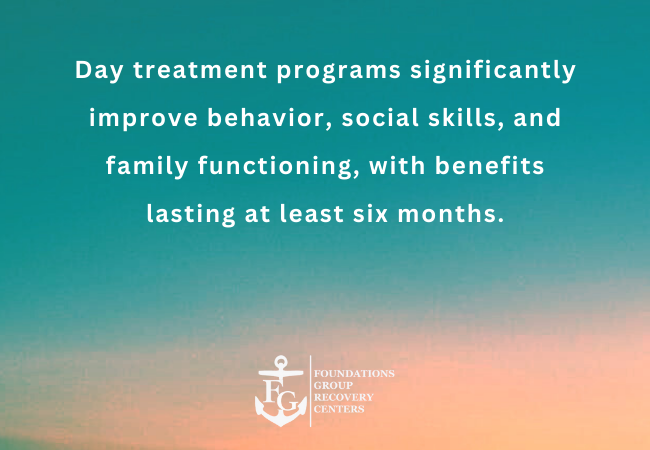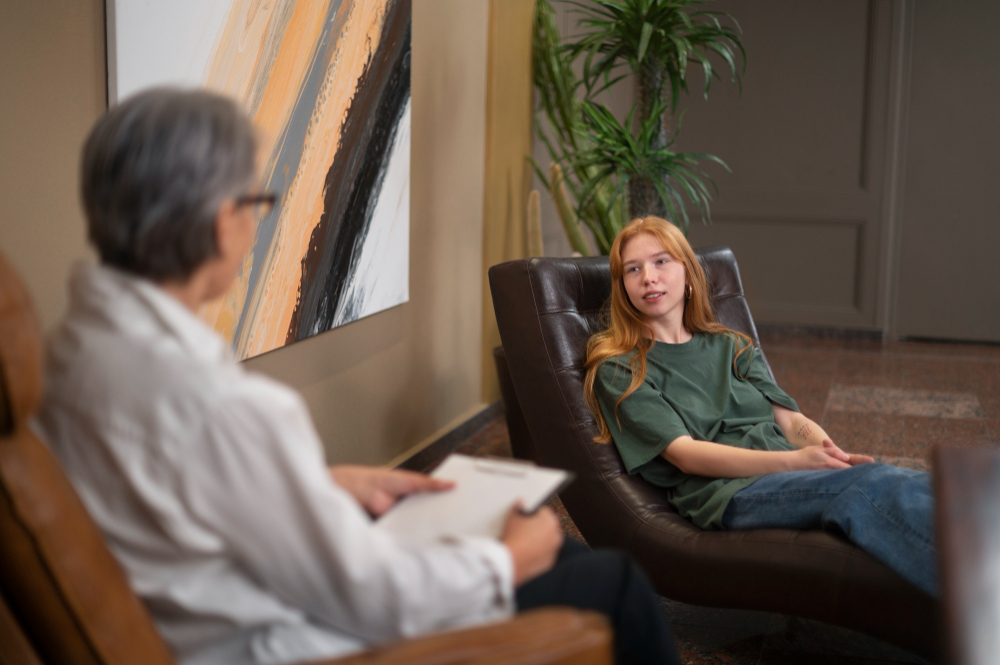For individuals experiencing mental health challenges, finding the right level of care is critical. While traditional outpatient therapy may not provide enough structure, inpatient hospitalization may be too intensive for some individuals. Day Treatment Programs, also known as Partial Hospitalization Programs (PHPs), offer a middle ground, providing structured therapy, medical supervision, and support services during the day while allowing participants to return home in the evening.
At Foundations Group Recovery Centers, we offer Day Treatment Programs in Massachusetts that provide a holistic, evidence-based approach to mental health treatment. Our programs help individuals develop coping skills, emotional regulation strategies, and relapse prevention techniques while maintaining a level of independence in their daily lives.
This guide explores:
- What a Day Treatment Program is and how it works
- The benefits of Day Treatment for mental health
- Who can benefit from a Day Treatment Program
- How Day Treatment compares to inpatient and outpatient care
- The structure and components of a Day Treatment Program
- New Section: The Role of Family in Day Treatment Programs
What Is a Day Treatment Program?
A Day Treatment Program provides a high level of mental health support in a structured environment, allowing individuals to participate in intensive therapy, psychiatric support, and skill-building activities without requiring overnight hospitalization.
How Day Treatment Works
- Individuals attend treatment sessions for several hours per day, usually five to six days per week.
- Treatment includes individual therapy, group therapy, psychiatric care, and holistic wellness practices.
- Participants focus on managing symptoms, building resilience, and developing practical coping skills.
Day Treatment provides the intensive support of inpatient care while allowing individuals to maintain some independence and connection with their community.
The Benefits of Day Treatment for Mental Health
1. Intensive Mental Health Support Without Full-Time Hospitalization
Day Treatment offers comprehensive mental health care without requiring individuals to stay overnight in a facility. Participants receive daily therapy, psychiatric care, and skill-building exercises to manage their mental health while remaining engaged in their personal lives.
2. Structured Routine for Stability
A structured daily schedule promotes mental wellness by:
- Establishing healthy routines.
- Providing consistent therapeutic support.
- Reducing emotional distress and preventing relapses into unhealthy patterns.
3. Access to Comprehensive Therapy Services
Day Treatment Programs offer a wide range of therapies, including:
- Individual Therapy: One-on-one sessions to work through personal challenges and mental health conditions.
- Group Therapy: A supportive environment where individuals connect with peers and share experiences.
- Cognitive-Behavioral Therapy (CBT): Helps individuals recognize and change negative thought patterns.
- Dialectical Behavior Therapy (DBT): Teaches skills such as emotional regulation, distress tolerance, and mindfulness.
4. Medication Management and Psychiatric Support
Many individuals in Day Treatment Programs receive medication-assisted support to help manage:
- Depression and anxiety disorders
- Bipolar disorder
- Post-traumatic stress disorder (PTSD)
- Obsessive-compulsive disorder (OCD)
- Co-occurring substance use disorders
Day Treatment provides ongoing psychiatric evaluations to ensure that medications are working effectively and adjusted as needed.
5. Flexibility to Maintain Personal Responsibilities
Unlike inpatient hospitalization, Day Treatment allows individuals to return home in the evenings. This flexibility is ideal for those who:
- Have work, school, or family commitments.
- Need intensive therapy but do not require 24/7 monitoring.
- Want a smooth transition from inpatient hospitalization to independent living.
6. Development of Coping Skills and Relapse Prevention
Many individuals struggle with managing stress, emotions, and triggers in daily life. Day Treatment Programs focus on:
- Mindfulness and stress reduction techniques.
- Healthy communication and conflict resolution skills.
- Identifying triggers and preventing relapse into negative behaviors.
How does a Day Treatment Program differ from Inpatient and Outpatient Care?
| Feature | Day Treatment (PHP) | Inpatient Care (Residential Treatment) | Outpatient Therapy |
|---|---|---|---|
| Time Commitment | Several hours per day, 5-6 days a week | 24/7 stay at a treatment facility | 1-2 therapy sessions per week |
| Flexibility | Allows individuals to return home daily | Requires full-time commitment | Minimal disruption to daily life |
| Ideal For | Individuals needing structured, intensive therapy without full hospitalization | Those with severe mental health conditions needing 24/7 supervision | Individuals with mild to moderate mental health concerns |
| Cost | More affordable than inpatient care | More expensive due to 24/7 care | Least expensive but offers less support |
| Medical Supervision | Available during program hours | 24/7 medical and psychiatric care | Occasional check-ins as needed |
Who Can Benefit from a Day Treatment Program?
A Day Treatment Program is beneficial for individuals who:
- Are struggling with anxiety, depression, PTSD, or mood disorders.
- Need more support than traditional outpatient therapy but do not require inpatient hospitalization.
- Have recently completed an inpatient program and need continued care.
- Want a highly structured environment to help them manage their symptoms.
- Are transitioning from Substance Use Treatment Programs in Massachusetts and need mental health support in early recovery.

The Role of Family in Day Treatment Programs
1. How Family Support Affects Recovery
Mental health treatment is most effective when individuals have a strong support system. Families play a crucial role in:
- Providing encouragement and accountability.
- Understanding the individual’s mental health challenges.
- Helping create a stable home environment that promotes recovery.
2. Family Therapy in Day Treatment
Many Day Treatment Programs include family therapy sessions to help:
- Improve communication between loved ones and the individual.
- Address misunderstandings about mental health conditions.
- Strengthen relationships and rebuild trust.
3. Educating Families on Mental Health and Recovery
Day Treatment Programs often provide educational workshops for family members to:
- Learn about mental health conditions and how they affect behavior.
- Recognize signs of relapse or worsening symptoms.
- Develop healthy boundaries and support strategies.
By integrating family therapy and education, Day Treatment Programs in Massachusetts help individuals receive long-term emotional and practical support from their loved ones.
Why Choose Foundations Group Recovery Centers?
At Foundations Group Recovery Centers, we provide evidence-based mental health treatment tailored to each individual’s needs.
What Makes Our Day Treatment Programs Stand Out?
- Highly trained mental health professionals providing personalized care.
- Customized treatment plans to address individual challenges.
- Integrated mental health and substance use treatment for individuals in recovery.
- Holistic approaches, including mindfulness, exercise therapy, and nutritional counseling.
- Flexible scheduling to accommodate work, school, and family responsibilities.
We believe that mental health treatment should be accessible, compassionate, and effective.
Conclusion
Mental health challenges can be overwhelming, but you don’t have to face them alone. Day Treatment Programs offer structured therapy and psychiatric care while allowing individuals to maintain their daily lives.
If you or a loved one is struggling with mental health concerns, seeking professional treatment is the first step toward healing. At Addiction Treatment Center in Massachusetts, we provide comprehensive, individualized care to help you achieve long-term mental wellness. Call Us Today at 844.763.4966 to Learn More About Our Day Treatment Programs and Start Your Journey Toward Wellness. A healthier, more balanced life starts today.
FAQ on Benefits of Day Treatment Programs
What is a Day Treatment Program for Mental Health?
A Day Treatment Program, also known as a Partial Hospitalization Program (PHP), provides structured therapy, psychiatric care, and support services for individuals experiencing mental health challenges. Participants attend treatment sessions for several hours per day but return home in the evening.
What mental health conditions are treated in a Day Treatment Program?
Day Treatment is designed to treat a range of mental health conditions, including:
- Depression and anxiety disorders
- Bipolar disorder
- Post-Traumatic Stress Disorder (PTSD)
- Obsessive-Compulsive Disorder (OCD)
- Co-occurring substance use disorders
What types of therapy are included in a Day Treatment Program?
- Individual Therapy: One-on-one sessions with a licensed therapist to address personal challenges.
- Group Therapy: A supportive environment for sharing experiences and developing coping skills.
- Cognitive-Behavioral Therapy (CBT): Helps individuals recognize and change negative thought patterns.
- Dialectical Behavior Therapy (DBT): Teaches emotional regulation, distress tolerance, and mindfulness.
- Medication Management: Psychiatric care and medication-assisted treatment (MAT) as needed.
Who should consider a Day Treatment Program?
Day Treatment is ideal for individuals who:
- Need more support than traditional outpatient therapy but do not require inpatient hospitalization.
- Are transitioning from inpatient care and need continued intensive therapy.
- Struggle with mental health symptoms that impact daily life, work, or relationships.
- Require medication management and psychiatric support in addition to therapy.
Can I work while attending a Day Treatment Program?
Many individuals can adjust their schedules to accommodate Day Treatment. If work flexibility is a concern, some participants transition to a Half Day Treatment Program or an Outpatient Program after completing Day Treatment.
How long does a Day Treatment Program last?
The length of treatment varies based on individual needs, but most programs last four to six weeks, with participants attending five to six days per week for several hours per day.

